MercoPress. South Atlantic News Agency
Tag: United States
-
Wednesday, July 13th 2011 - 16:30 UTC
Fed ready to inject new stimulus if US economy remains persistently weak

Federal Reserve Chairman Ben Bernanke said the central bank is ready to ease monetary policy further if the economy weakens and inflation moves lower, suggesting policymakers are actively mulling further stimulus.
-
Saturday, July 9th 2011 - 07:26 UTC
US jobs data for June disappoints markets: unemployment again at 9.2%

US employment growth ground to a halt in June, with employers hiring the fewest number of workers in nine months, dousing hopes the economy would regain momentum in the second half of the year.
-
Saturday, July 9th 2011 - 06:51 UTC
Obama says debt-limit controversy fuelling uncertainty in the business sector

President Barack Obama cited gloomy jobs numbers as one more reason lawmakers must strike a deal soon to raise the US debt limit, saying the impasse was fuelling uncertainty within financial markets and in the business sector.
-
Thursday, July 7th 2011 - 07:11 UTC
UK Supreme Court rules against Argentina in defaulted sovereign bonds case
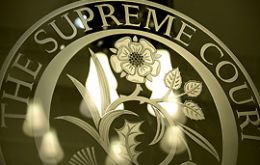
A hedge fund owner of defaulted Argentine debt can try to seize government assets held in Britain as it seeks to recover the full face value of the bonds, Britain's Supreme Court said in a ruling on Wednesday.
-
Wednesday, June 29th 2011 - 16:26 UTC
US latest wars have cost the Treasury 4.4 trillion USD, says academic report

United States President Barack Obama cited cost as a reason to bring troops home from Afghanistan and referred to a one trillion US dollars price tag for US wars. The figure grossly underestimates the total cost of wars in Iraq, Afghanistan and Pakistan to the US Treasury and ignores more imposing costs yet to come, according to a study released Wednesday.
-
Monday, June 27th 2011 - 18:48 UTC
Federal Reserve will remain biggest buyer of US Treasury bills

The Federal Reserve will remain the biggest buyer of Treasuries, even after the second round of quantitative easing ends this week, as the central bank uses its 2.86 trillion US dollars balance sheet to keep interest rates low.
-
Monday, June 27th 2011 - 16:48 UTC
US consumer spending flat in May reflecting a fall in auto sales
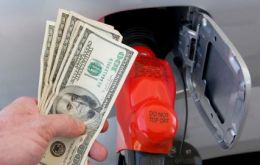
Consumer spending in the United States was unchanged in May for the first time in almost a year, likely reflecting a plunge in auto sales, according to a US government report, that also showed a build-up in underlying inflation pressures.
-
Friday, June 24th 2011 - 22:44 UTC
US economy expanded at a 1.9% annual pace in the first quarter
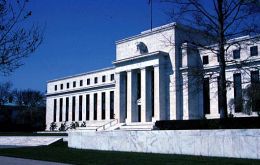
The United States economy grew at a 1.9% pace in the first quarter marking the start of what Federal Reserve policy makers anticipate is a temporary slowdown in growth.
-
Tuesday, June 21st 2011 - 03:57 UTC
Struggling to preserve Falklands’ self-determination in the South Atlantic
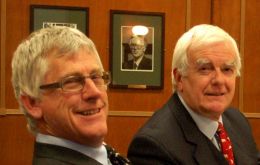
(*) By Roger Edwards and Dick Sawle
Visiting the United States, with its bustling streets in Washington and Manhattan, is always a bit of a culture shock for a Falkland Islander. While we have much in common – a shared ancestry and language, and the democratic values that underpin our societies – we have a few differences too. -
Friday, June 17th 2011 - 06:03 UTC
US current account deficit up 6.3% spurred by imports of more expensive oil
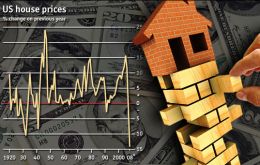
The US current account deficit rose 6.3% to $119.3bn in the first three months of the year, the Commerce Department has said. Strong exports of cars, computers and machinery were offset by imports, particularly of more expensive oil.
